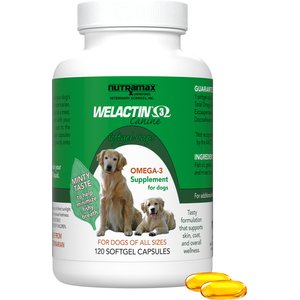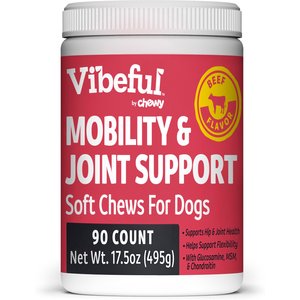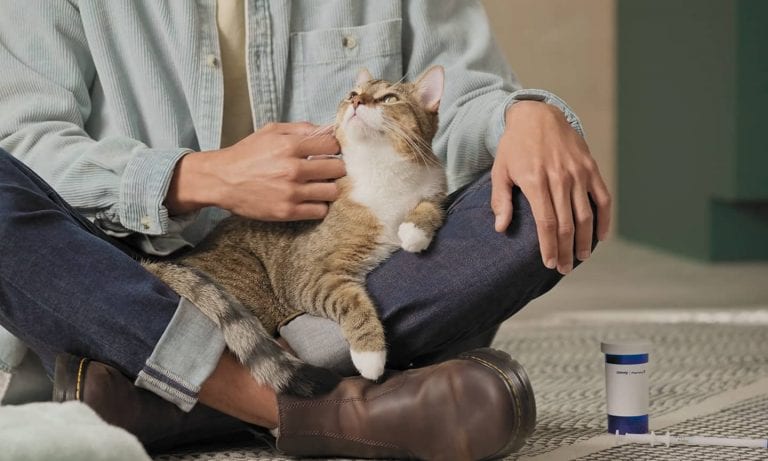When winter arrives and the weather takes that sharp turn into spine-tingling cold territory, how do you keep your pet warm and healthy? Many of us might buy our pets a winter coat or snow booties for chilly walks. But when it comes to their overall health, have you ever considered giving your pet supplements?
During the winter months, the two most common issues dogs and cats face due to cold weather are dry skin and joint pain, says Stephanie Howe, DVM, Chewy pet health representative. She and fellow Chewy Pet Health Representative Leslie Gillette, DVM, explain how supplements can help.
Always check with your vet before giving your pet supplements. They can recommend the best supplement for your pet.
Winter Supplements for Dogs

Supplements for Dogs With Dry Skin
Cold weather can be very drying to your dog’s skin, which can cause itching and irritation. “Utilizing products targeted to skin health can help keep your pet’s skin and coat healthy during dry weather,” Dr. Howe says.
For dog supplements for dry skin, look for omega-3 fatty acids. Adding omega-3 fatty acids to your dog’s food can help protect and encourage a healthy skin barrier. This will give your dog’s skin more resistance to cold weather.
Dr. Howe recommends the following supplements for your dog’s coat and skin:
Supplements for Dogs With Joint Pain
While joint pain in winter is a common occurrence in both pets and humans, Dr. Howe says there isn’t an exact explanation for the connection between cold weather and joint pain.
Still, senior dogs or dogs with arthritis could benefit from supplements.
“Atmospheric pressures may play a role in causing joints to expand and stretch already inflamed tissues in our arthritic pets,” Dr. Howe says. “Ensuring that your senior pet is on a great joint supportive supplement can help to mitigate some of that joint discomfort.”
For dog supplements for joint pain, look for the following ingredients:
- Glucosamine, a natural compound found in cartilage
- Chondroitin, a natural molecule that is a major component of cartilage
- Methylsulfonylmethane (MSM), a natural compound that may support joint health
- Green-lipped mussel, a shellfish extract that can help treat arthritis
“Joint supplements containing these ingredients can be helpful for geriatric pets or those with a previous orthopedic injury,” explains Dr. Gillette. Vibeful Mobility and Joint Support Joint Supplement, for example, contains glucosamine, chondroitin, and MSM.
Dr. Howe recommends the following products for joint support:
Winter Supplements for Cats

Supplements for Cats With Dry Skin
Like their canine counterparts, cats can also experience dry skin during winter when the temperature drops outside and the heater kicks on inside, causing the air to dry out.
For cat supplements for dry skin, look for fatty acid supplements, like omega-3 supplements. These “will help cats who suffer from dry, flaky skin or brittle fur,” Dr. Gillette says.
Dr. Gillette recommends the following products to help keep your cat’s skin and coat healthy:
Supplements for Cats With Joint Pain
While joint pain is more obvious in dogs, some cats might need extra joint support, especially during the winter when cats with arthritis could experience stiffer joints and worse pain.
Certain supplements can help maintain their joint health, reduce pain and inflammation, and repair cartilage.
For cat supplements for joint pain, look for the following ingredients:
- Glucosamine, a natural compound found in cartilage
- Chondroitin, a natural molecule that is a major component of cartilage
- MSM, a natural compound that may support joint health
- Green-lipped mussel, a shellfish extract that can help treat arthritis
Dr. Gillette recommends Nutramax Dasuquin Capsules.
Not all Pets Need Supplements
If you’re feeding a complete and balanced diet—meaning it meets the nutritional standards outlined by the Association of American Feed Control Officials (AAFCO)—then general vitamin and mineral supplements are not needed on top of regular diets, says Dr. Howe.
The standards for complete and balanced dog food include minimum (but not excessive) levels of about 40 nutrients vital for dogs and cats. Commercial pet foods are formulated to meet these nutrient requirements.
However, “some pets may benefit from area-specific help, such as for joints or dry skin,” Dr. Howe adds.
So, check with your vet before giving your pet supplements.
This content was medically reviewed by Tara Hansen, DVM, Chewy veterinarian.
More about supplements:
Share:






















